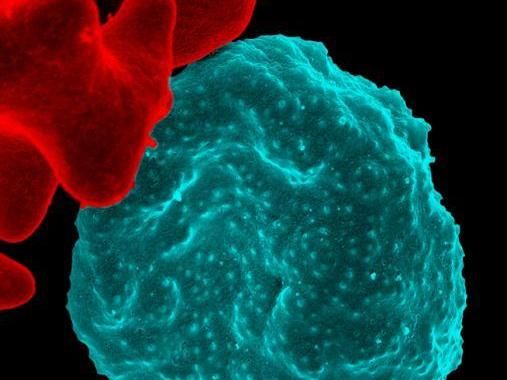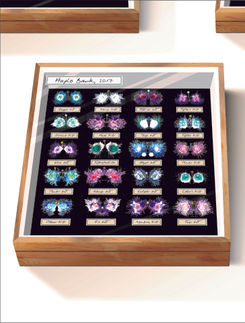Essential malaria parasite genes revealed
NIAID-funded research could aid antimalarial drug development
Researchers have exploited a quirk in the genetic make-up of the deadly malaria parasite, Plasmodium falciparum, to create 38,000 mutant strains and then determine which of the organism's genes are essential to its growth and survival. P. falciparum is responsible for about half of all malaria cases and 90 percent of all malaria deaths. New information about the parasite's critical gene repertoire could help investigators prioritize targets for future antimalarial drug development.

Colorized scanning electron micrograph of red blood cell infected with malaria parasites, which are colorized in blue.
NIAID
The international research team led by John H. Adams, Ph.D., of the University of South Florida, was supported by the National Institute of Allergy and Infectious Diseases (NIAID), part of the National Institutes of Health. Rays H.Y. Jiang, Ph.D., of Universtiy of South Florida, and Julian C. Rayner, Ph.D., of the Wellcome Trust Sanger Institute, U.K., collaborated with Dr. Adams in this research.
The complete genetic sequence of P. falciparum was determined more than a decade ago, but the functions of most of its genes remain unknown, and until now only a few hundred mutant strains had been created in the lab. The difficulties in manipulating P. falciparum stem in part from the extremely high percentage of adenine or thymine (two of the four chemical building blocks that make up DNA) in its genome. Standard methods for creating mutants rely on more variation in gene sequences and so do not work on P. falciparum. In the new research, Dr. Adams and his colleagues created mutated versions of nearly all the parasite's 6,000 genes with a technique that preferentially targets areas rich in adenine and thymine, thus exploiting the very feature that had foiled previous attempts at genetic manipulation.
The team used computational analysis to distinguish non-essential genes (those that could be mutated) from essential, non-mutable ones. About 2,600 were identified as indispensable for growth and survival during the parasite's asexual, blood stage. These included ones associated with P. falciparum's ability to resist antimalaria drugs, highlighting them as high-priority targets for new or improved antimalarial compounds, the researchers note.
Original publication
M Zhang et al; "Uncovering the essential genes of the human malaria parasite Plasmodium falciparum by saturation mutagenesis"; Science; 2018
Most read news
Original publication
M Zhang et al; "Uncovering the essential genes of the human malaria parasite Plasmodium falciparum by saturation mutagenesis"; Science; 2018
Organizations
Other news from the department science

Get the life science industry in your inbox
By submitting this form you agree that LUMITOS AG will send you the newsletter(s) selected above by email. Your data will not be passed on to third parties. Your data will be stored and processed in accordance with our data protection regulations. LUMITOS may contact you by email for the purpose of advertising or market and opinion surveys. You can revoke your consent at any time without giving reasons to LUMITOS AG, Ernst-Augustin-Str. 2, 12489 Berlin, Germany or by e-mail at revoke@lumitos.com with effect for the future. In addition, each email contains a link to unsubscribe from the corresponding newsletter.





















































